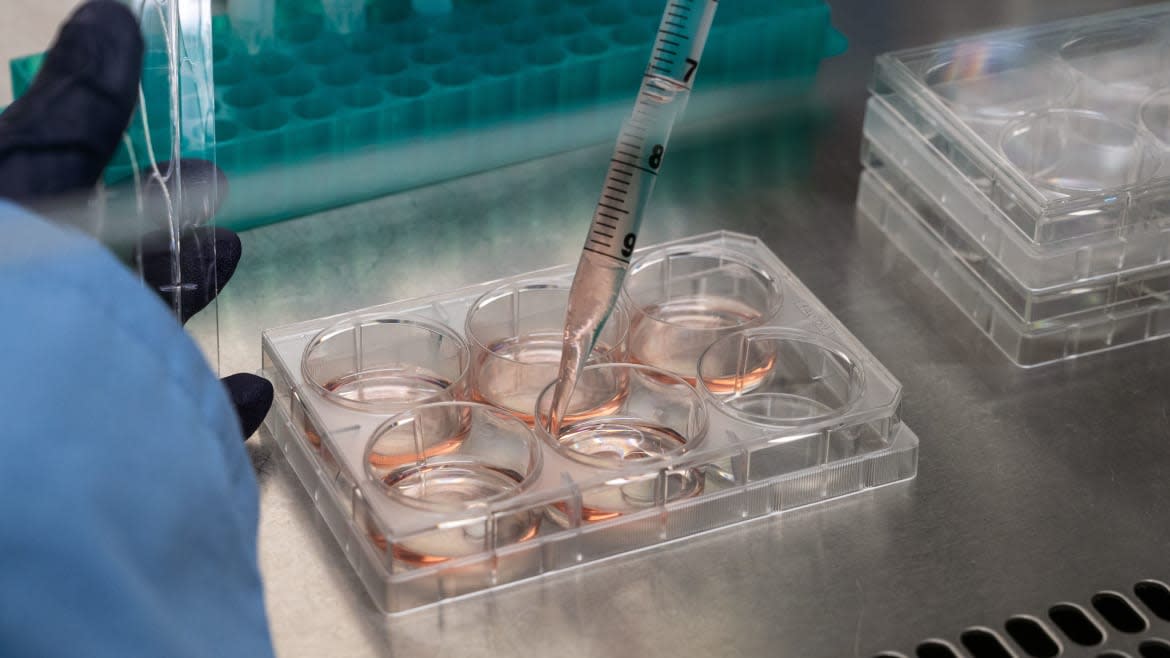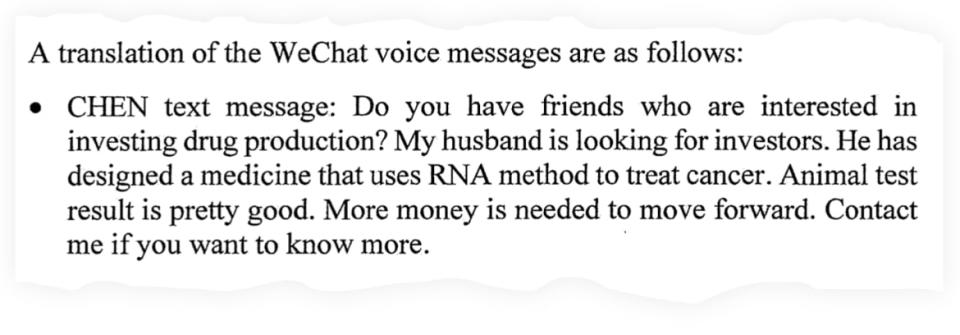Scientist Slipped Hubby Cancer Vax Secrets for His Lab, Feds Allege

A Chinese scientist living in San Diego and working to develop an mRNA cancer vaccine gave her scientist husband confidential data from her employer so he could “further” his own vaccine research at his lab in China, a criminal complaint filed Wednesday in Southern California federal court alleges.
Last May, Chenyan Wu arrived at Seattle-Tacoma International Airport on a flight from Shanghai with as many as 1,000 undeclared, improperly packaged, and unlabeled centrifuge tubes containing research samples, the filing states. Wu’s luggage also held “multiple containers of lab chemicals,” which border officers believed were “potentially hazardous.”
When the FBI interviewed Wu, he told agents he had been running a cancer research company in China for the past 10 years called TheraMab, according to the complaint. Wu and his wife, Lianchun Chen, had a home in San Diego, and Wu explained that he had shut down his Chinese operation to continue his cancer research at a new lab he planned to establish in California.
By that time, Wu and Chen had been on the feds’ radar for more than a year, according to the complaint against them. In December 2019, the FBI “found a Powerpoint presentation on the cell phone of a Chinese Defendant, who had previously pled guilty to export control violations,” states the complaint against Wu and Chen. “The presentation was in Mandarin. Once translated, the cover page of the packet read: ‘TheraMab’s mRNA Cancer Vaccine Project,’ presented by Chenyan Wu. The presentation outlined TheraMab’s company structure and investment plan and summarized its mRNA research process.”
He Leaked U.S. Missile Secrets. It Turned Into ‘a Dark Comedy of Errors.’
Wu had been utilizing proprietary research from an unnamed company that Chen had improperly divulged, according to the feds. Both Wu and Chen are each now facing one felony count of making false statements about the confidential data. Wu is also charged with smuggling, stemming from the incident at Sea-Tac.
Pharmaceutical trade secrets are in high demand. Last month, Pfizer filed a lawsuit against employee Chun Xiao Li, accusing the associate director of statistics of pilfering more than 12,000 confidential files and documents, including ones pertaining to the company’s COVID-19 vaccine, as she prepared to leave for a job with a competitor. Earlier this year, Merck’s director of immuno-oncology was arrested for allegedly stealing “thousands of files containing [Merck’s] proprietary information, including research protocols, compound data, [and] strategic plans.” In July, two former Genentech scientists, Xanthe and Allen Lam, pleaded guilty to stealing company secrets related to a series of cancer and cystic fibrosis drugs and leaking them to a Taiwanese biotech startup for which Xanthe had been working covertly.
During a search of Wu’s email account, FBI agents “identified multiple emails” between Wu and his wife, Lianchun Chen, over the course of roughly five years. Some of the messages included documents marked “CONFIDENTIAL” by a company identified in the complaint only as “Company A.”
In one instance, Wu allegedly sent a message to Chen via his Hotmail account, saying, “I need new vector sequences and sequence [sic] to be cloned.” Chen responded with a Microsoft Word document “which included DNA sequence data consistent with the research that Chen had been working on for Company A at the time,” the complaint states.
In another, Wu allegedly received a PowerPoint attachment and a Word document from Chen to his Hotmail account, which he then forwarded to his TheraMab email. The PowerPoint was titled “PCR Results with Q5 and Pfx,” and was marked “[Company A] CONFIDENTIAL,” according to the complaint. The Word document was titled “Work Weekly Update May 21-27,” and included “an update of Chen’s work…for the past week and the work Chen planned to achieve the following week.”
A third example laid out by prosecutors allegedly contained a PowerPoint presentation from Company A’s Vaccine Research & Development unit, also marked “CONFIDENTIAL.”
“Company A is investigating whether the attachments to these emails would qualify as trade secrets,” the complaint states. “A Company A representative did note that the work that Chen and her group were conducting at Company A would be extremely useful to Wu’s TheraMab's project of developing a generic mRNA vaccine.”
The company confirmed that Chen worked there from 2011 until Sept. 9, 2021, and “conducted mRNA cancer vaccine research.” Wu had also worked for the company in the U.K. from 1999 to 2010, but did not work on mRNA research, according to the complaint. Company officials told the FBI that the attachments Chen sent to Wu “mirrored some of the work” she did for the company.
Chen had been “very involved in…mRNA cancer research,” developing proprietary DNA vectors for use in vaccines, the filing continues. Company A employees, including Chen, received annual training on the importance of confidentiality in their research,” it says. “Nonetheless, Chen could have downloaded Company A confidential information onto a thumb drive, printed out copies or taken pictures of it with her phone, and removed it from the premises.”

In late 2019, Chen allegedly sent a text message, in Chinese, to an unnamed recipient. According to the FBI’s translation, it read: “Do you have friends who are interested in investing drug production? My husband is looking for investors. He has designed a medicine that uses RNA method to treat cancer. Animal test result is pretty good. More money is needed to move forward. Contact me if you want to know more.”
When the feds interviewed Chen in April 2020 at the San Diego home she shares with Wu, she denied having authored the research paper FBI agents found on Wu’s cell phone. The agents warned her that lying to a federal agent was a felony. Still, Chen insisted that mRNA vaccines were not her area of expertise, and that open-source information about mRNA was available in published papers, the complaint says, adding that she “conceded that her group at Company A was working on an mRNA project but minimized her role.”
Chen said she “only worked on a small part of the project and did not conduct any research or analysis,” it continues. “She maintained that she solely worked on the DNA/molecular structure part, which was at the very beginning. Once she did her part, the research was passed on for others to work on the next step. She did not review the results of the program trials and was not part of developing any research. She maintained that she had not disclosed any of that research to Wu.”
FBI agents questioned Wu at least three times, according to the complaint. He claimed to have garnered all of his research and knowledge about mRNA vaccines from publicly available sources. From 2017 on, Wu was developing a “generic vaccine, while Company A’s mRNA project focused on a specific type of cancer,” the complaint says. He told agents that Chen hadn’t shared any information with him about Company A’s research, and besides—she “did not have the skills or training to work on TheraMab’s mRNA project.”
Wu and Chen do not yet have lawyers listed in court records, and were unable to be reached for comment.
Got a tip? Send it to The Daily Beast here
Get our top stories in your inbox every day. Sign up now!
Daily Beast Membership: Beast Inside goes deeper on the stories that matter to you. Learn more.
